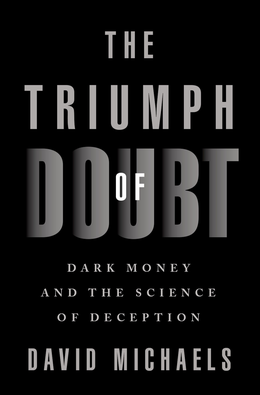The Triumph of Doubt
The Triumph of Doubt: Dark Money and the Science of Deception is a book that delves into the complex world of how scientific evidence is manipulated or obscured by corporations and industries to influence policy and public opinion. Authored by David Michaels, an epidemiologist and former Assistant Secretary of Labor for Occupational Safety and Health under the Obama administration, the book provides an in-depth look at the tactics used by various industries to cast doubt on scientific consensus and regulatory science.
Summary[edit | edit source]
The Triumph of Doubt exposes the strategies employed by tobacco, pharmaceutical, and fossil fuel companies, among others, to question the validity of scientific studies that could harm their profits. Michaels illustrates how these industries hire "product defense" consultants to discredit scientific findings, influence regulatory processes, and create their own studies that produce favorable outcomes. The book highlights several case studies, including the manipulation of research on the health impacts of tobacco smoke, opioids, sugar, and climate change, showcasing the breadth and depth of the issue.
Themes[edit | edit source]
The book touches on several key themes, including the abuse of science, the influence of dark money in politics and research, and the ethical responsibilities of scientists. Michaels argues for the need for stronger regulatory frameworks to protect public health and the environment from corporate interests. He also discusses the role of conflict of interest in scientific research and the importance of transparency and integrity in the scientific community.
Reception[edit | edit source]
The Triumph of Doubt has been praised for its thorough research and engaging writing style. Critics have highlighted its importance in shedding light on the mechanisms through which corporate interests can undermine public health and safety. However, some have criticized it for its perceived bias against industry, arguing that Michaels does not sufficiently acknowledge instances where regulatory science can be flawed or overly cautious.
Impact[edit | edit source]
The book has sparked discussions among policymakers, researchers, and the public about the need for reforms in how scientific evidence is used in policy-making. It has been cited in debates on regulatory reform and has contributed to a growing awareness of the challenges facing the integrity of science in the face of powerful economic interests.
See Also[edit | edit source]
Search WikiMD
Ad.Tired of being Overweight? Try W8MD's physician weight loss program.
Semaglutide (Ozempic / Wegovy and Tirzepatide (Mounjaro / Zepbound) available.
Advertise on WikiMD
|
WikiMD's Wellness Encyclopedia |
| Let Food Be Thy Medicine Medicine Thy Food - Hippocrates |
Translate this page: - East Asian
中文,
日本,
한국어,
South Asian
हिन्दी,
தமிழ்,
తెలుగు,
Urdu,
ಕನ್ನಡ,
Southeast Asian
Indonesian,
Vietnamese,
Thai,
မြန်မာဘာသာ,
বাংলা
European
español,
Deutsch,
français,
Greek,
português do Brasil,
polski,
română,
русский,
Nederlands,
norsk,
svenska,
suomi,
Italian
Middle Eastern & African
عربى,
Turkish,
Persian,
Hebrew,
Afrikaans,
isiZulu,
Kiswahili,
Other
Bulgarian,
Hungarian,
Czech,
Swedish,
മലയാളം,
मराठी,
ਪੰਜਾਬੀ,
ગુજરાતી,
Portuguese,
Ukrainian
Medical Disclaimer: WikiMD is not a substitute for professional medical advice. The information on WikiMD is provided as an information resource only, may be incorrect, outdated or misleading, and is not to be used or relied on for any diagnostic or treatment purposes. Please consult your health care provider before making any healthcare decisions or for guidance about a specific medical condition. WikiMD expressly disclaims responsibility, and shall have no liability, for any damages, loss, injury, or liability whatsoever suffered as a result of your reliance on the information contained in this site. By visiting this site you agree to the foregoing terms and conditions, which may from time to time be changed or supplemented by WikiMD. If you do not agree to the foregoing terms and conditions, you should not enter or use this site. See full disclaimer.
Credits:Most images are courtesy of Wikimedia commons, and templates Wikipedia, licensed under CC BY SA or similar.
Contributors: Prab R. Tumpati, MD

